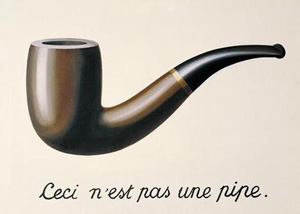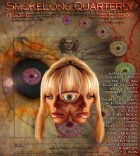That first sentence is killah. From where did that come?
There was a piece on John Ashbery in The New Yorker over the summer, and in it the author points out that Ashbery hardly ever reads an entire book. Ever since I started writing, I’ve done about the same thing most mornings; I’ll fart around in a couple books and then sit down at the computer and see how it plays out. This whole piece was mostly a response to a Grant Morrison Batman trade titled Arkham Asylum (a beautiful, esoteric thing on family, insanity and the effect of the latter on the former) and Brian Greene’s books on Quantum and String theory. I guess I wanted to start it with a sense of unease, which I think is at the heart of pretty much everything, but especially the kind of monism that physics argues for. I suppose I also felt that there was a very fight-or-flight response to completely seeing the world that way (i.e., as reducible to this infinitesimally small and incredibly unpredictable microcosm), which could result in all manner of seemingly strange behavior.
Explain, if you would be so kind, how the repetition of “was not an ill man” is essential to this piece.
I think it’s a continual refutation of the gravity invoked in that first sentence. I didn’t want it to be “a story about my crazy dad,” nor did I want this to be a simple transference of epiphany from father to son. So, this process of both an idea and the story’s focus moving and changing from the father to the son is an attempt at seriously evolving an unwieldy mess of thought in a small amount of words. The “not an ill man” mantra was to keep me on track, and also to play with the reader (hopefully) moving from disbelieving it to thinking it potentially true.
“My father is weightless, standing atop a river of blue tile, untouched and not touching. In the smallest world, we all are.” That’s gorgeous. The expansion from my father to “we all are” leaves me breathless. How did you come to realize that this flash should end as it does?
Again with my citing an interview! There’s a great scene in Ed Harris’s film on Jackson Pollock where Harris/Pollock is asked a similar question on when he knew his paintings were done, to which he responds “how do you know when you’re finished making love?” As cheesy or antiquated as that notion may sometimes seem, I think it’s true of anything involving the creative faculty. If it doesn’t have that semi-unconscious orgasmic build and climax, it never feels done. I feel like I got lucky and hit a good rhythm and the words followed. It was also a bit of lapsing into poetic-mindedness, which is a really fulfilling (yet dangerous, as I think it can easily teeter over into pretension) way to end short or flash fiction.
How does your strong poetry background inform your flash fiction?
I guess I touched on it above, but I think the two come from the same distinct type of creation-through-language. They both rely on economy, and they both commonly demand a sense of less-than-obvious movement. If a poem is basically one big, clear and bold line from A to B, no idea or detail can save it from being glossed over or boring to the reader. Flash fiction is hardly any different, save that it forces a more calculated movement from the writer, whereas in poetry it can be almost nonexistent and often work nonetheless.
The 2005 Edge Annual World Question (www.edge.org) asked a question that the BBC called “fantastically stimulating.” One year later, we ask you this same question: “What do you believe is true even though you cannot prove it?”
I was so afraid of the other replies I gave seeming pretentious that it took me about half and hour to decide on an answer to this! I actually had a conversation that accidentally veered into territory like this with Matt (Bell) a few days ago, about truth/universality and its seeming impossibility. But while we came up with nothing at the time, I think I might argue for a belief that truth is fundamentally nonverbal. It may seem postured or faux-Buddhist, but I think it’s true that any lasting realization of psychological value is rooted in an inexplicable thought, feeling or experience. Conversely, truths that are easily explained or seem logically sound invariably disintegrate through prolonged skepticism or examination. Well aware that it sounds grandiose, I’d say the best kinds of literature, be they poetry or fiction, function with that type of ambiguity underlying their epiphanic moments.



 The core workshop of SmokeLong Fitness is all in writing, so you can take part from anywhere at anytime. We are excited about creating a supportive, consistent and structured environment for flash writers to work on their craft in a community. We are thrilled and proud to say that our workshop participants have won, placed, or been listed in every major flash competition. Community works.
The core workshop of SmokeLong Fitness is all in writing, so you can take part from anywhere at anytime. We are excited about creating a supportive, consistent and structured environment for flash writers to work on their craft in a community. We are thrilled and proud to say that our workshop participants have won, placed, or been listed in every major flash competition. Community works.